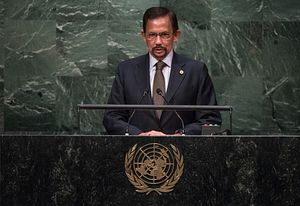For decades, Brunei, a tiny, oil-rich sultanate in Southeast Asia, had managed to chart its own course, underpinned by energy wealth that allowed it to deliver some of the highest standards of living in the world, maintain its independence, and preserve an outlook based on ancient Malay traditions and the later arrival of Islam.
But in recent years, cracks have begun to appear in the country. Falling energy prices had prompted a series of worrying developments at home and abroad, from massive budget cuts and personnel reshuffles at home to Brunei’s silence over its claims in the South China Sea even amid growing worries of Chinese assertiveness. There has also been increasing scrutiny on certain manifestations of these cracks, be it the lavish excesses of members of the royal family or the hardening of religion in the country.
The past few weeks have seen another wave of focus on Brunei with an Islamic penal code being formally adopted by Brunei. The revised laws, which were first announced about five years ago, have now finally been promulgated, leading to a chorus of international criticism abroad.
The focus has been on celebrity entertainers, such as Ellen DeGeneres, Elton John, and George Clooney, who are leading a boycott of the Brunei royal family’s stable of swanky hotels throughout the world. But many governments have also expressed disapproval in various forms, including the United States, Germany, France, Britain, and Australia. The United Nations voiced its concern about the move. The New York Times headlined: “Brunei’s Barbarity and Hypocrisy.”
The outrage is not unjustified given what these laws say. Gays, adulterers, and women who have abortions face death by stoning. For condemned lesbians, it’s 100 lashes – usually fatal – while thieves will have their limbs amputated. Offenses such as rape, sodomy, robbery, and insulting the Prophet Muhammad also carry the death penalty, and that includes children who have reached puberty.
While this formal move has been undertaken, it is unclear exactly to what extent it will be enforced. Some have suggested that this is merely an effort to put something on the books for the leadership to consolidate its power around religion, rather than a move designed at actually cracking down on the offenses mentioned above.
But that is besides the point. The fact that Brunei has moved to actually put these laws on the books is itself a significant development in the country’s trajectory, irrespective of how they may or may not actually operate in practice. Suggestions about how this might apply to ordinary Bruneians also miss the point – the root of the issue is that ordinary Bruneians, including non-Muslims, do not have such a say on issues and yet have to live with the consequences of decisions being made by the leadership. It should also be pointed out that Brunei doesn’t exactly have many outlets where dissent can be freely expressed, including criticism of the royal family.
Much of the focus on Brunei’s recent laws has been on the development in and of itself. But while this is no doubt significant, one should not lose sight of the bigger picture, which is one where we are seeing deepening cracks in the oil-rich sultanate, and a series of troubling decisions being taken by it leaders in response.
Luke Hunt can be followed in Twitter @lukeanthonyhunt

































